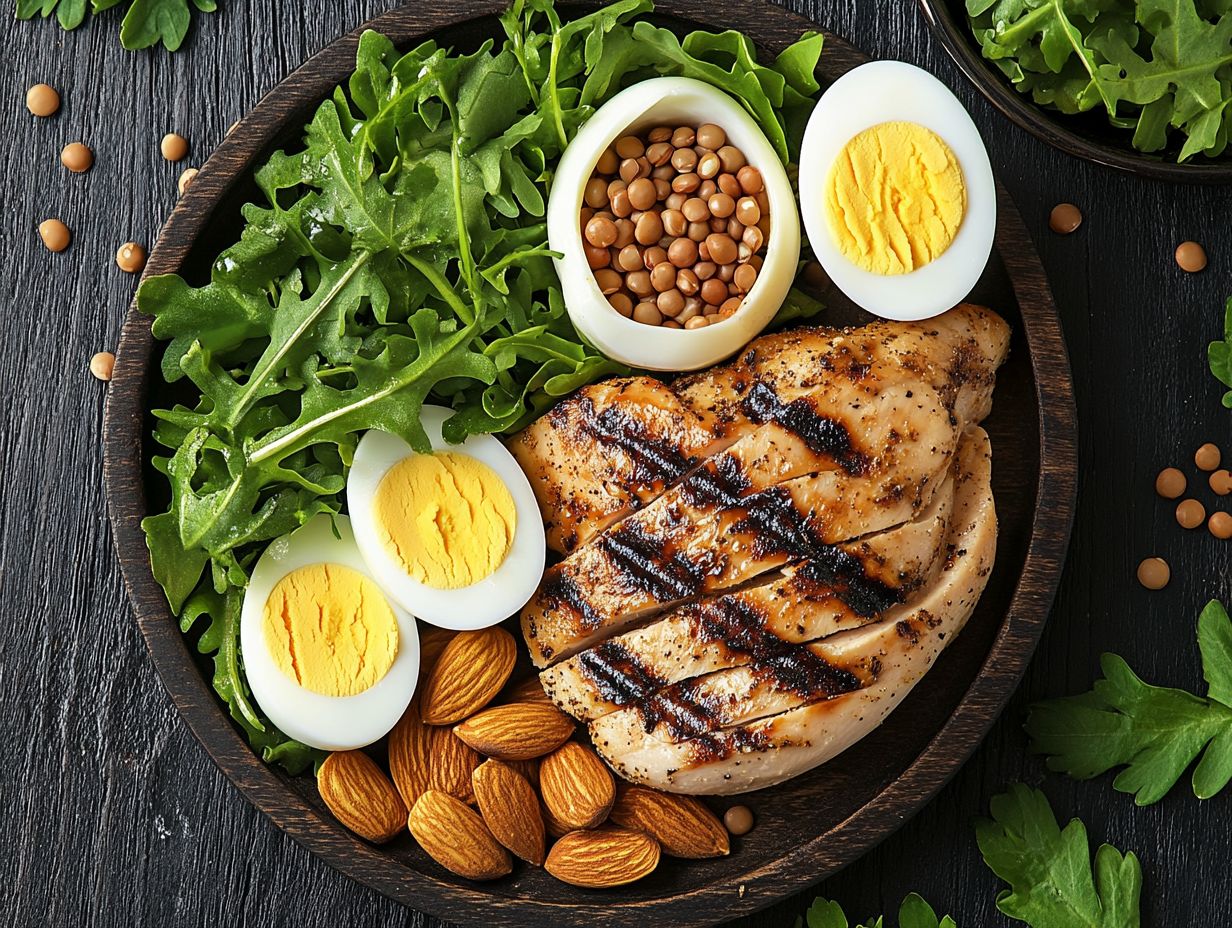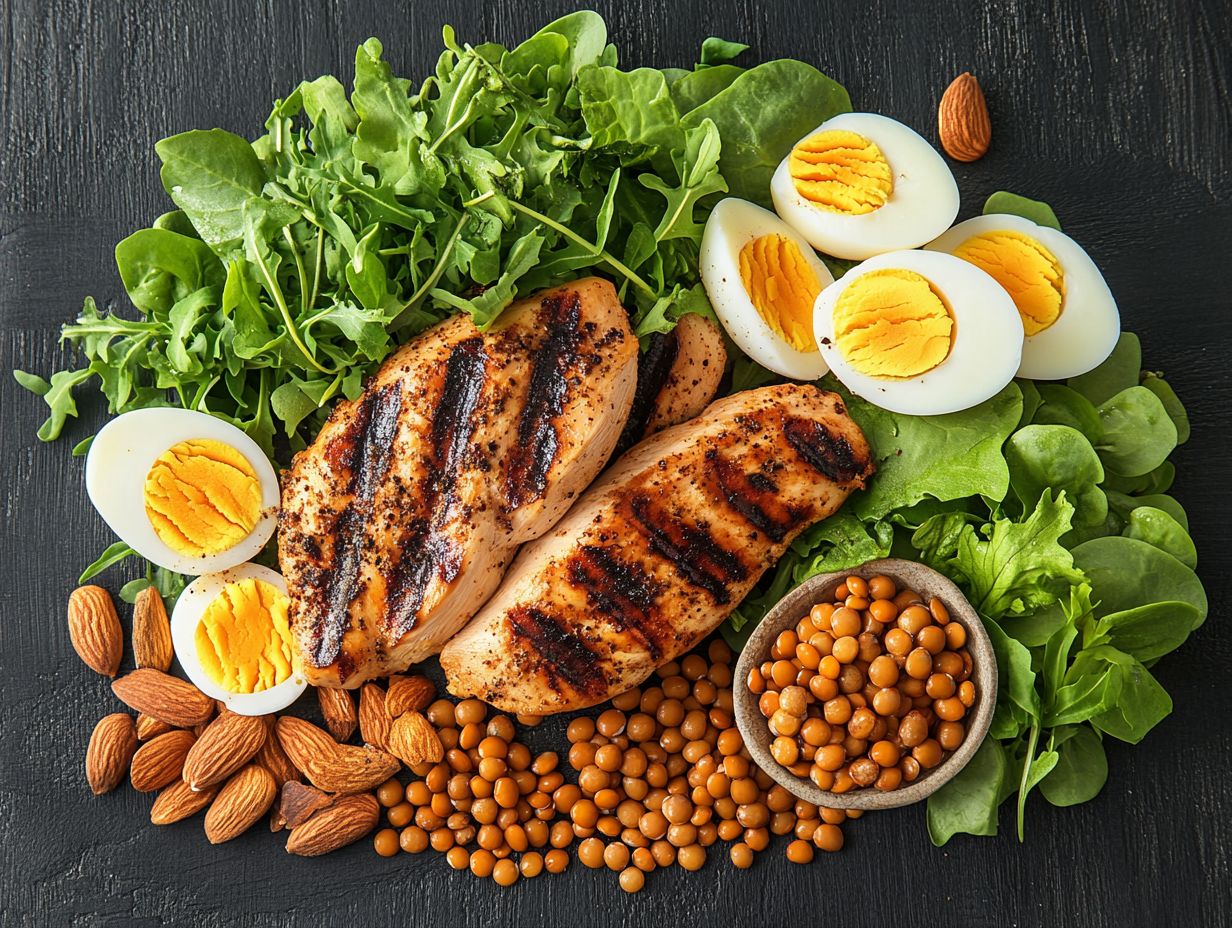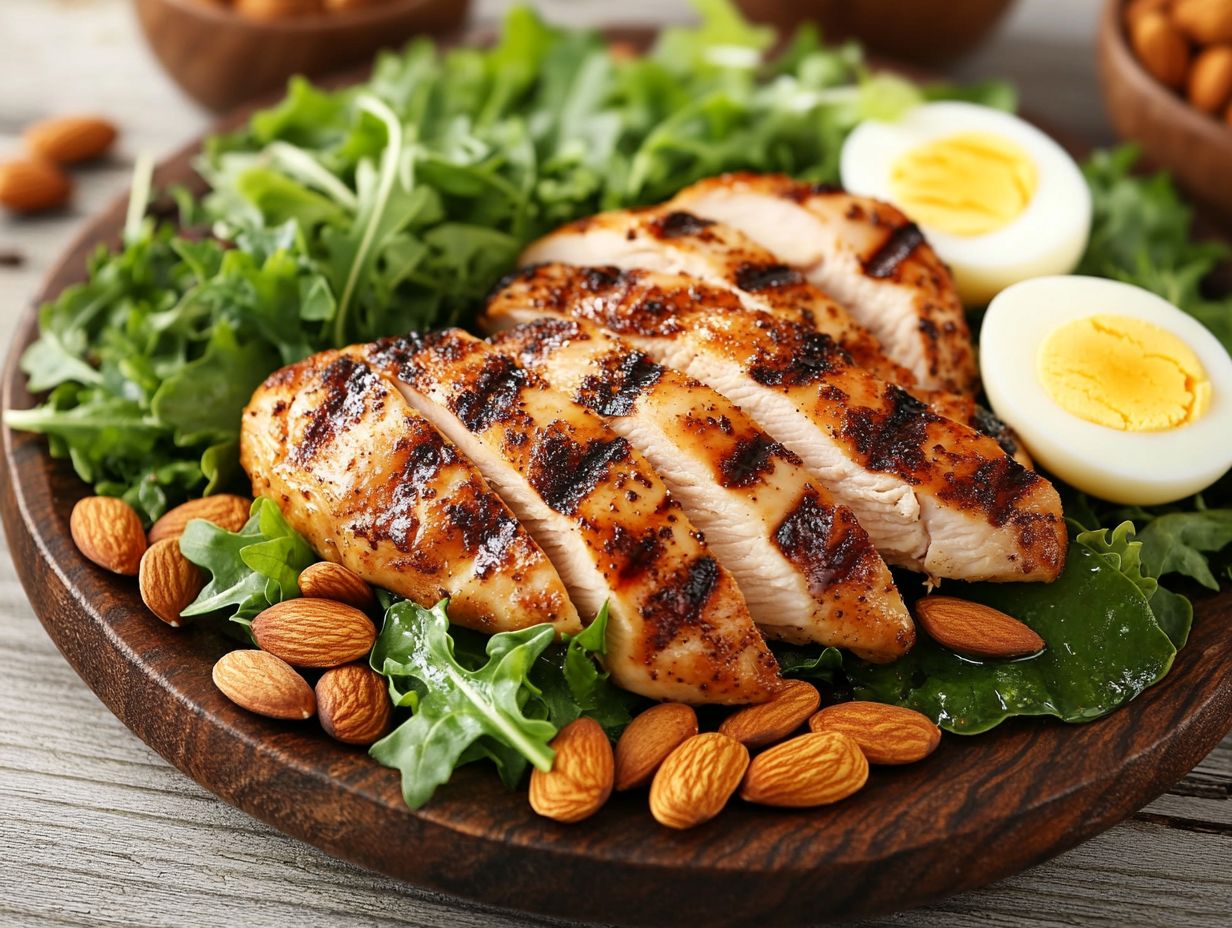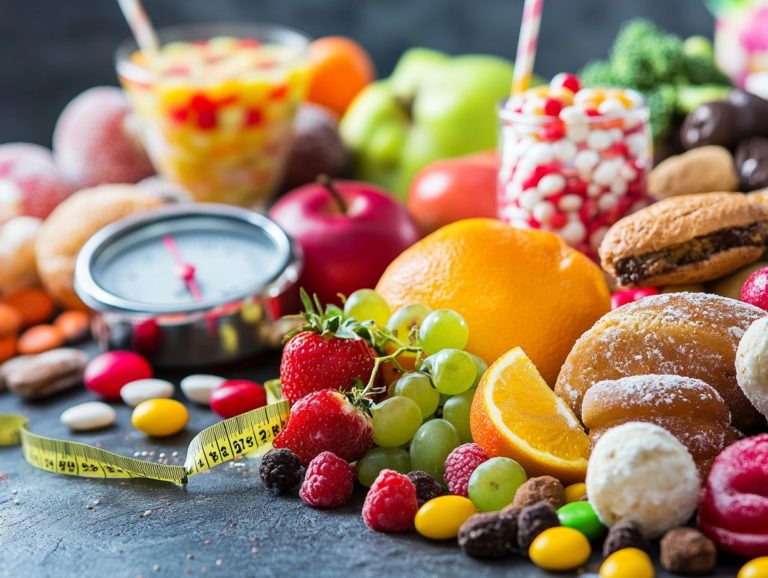The Truth About High-Protein Diets
Curious about high-protein diets? They ve gained significant popularity among those aiming to shed pounds and improve their overall health. But are they the right fit for you?
This article delves into what a high-protein diet truly involves, emphasizing its benefits, possible risks, and strategies for seamlessly incorporating protein into your meals.
Whether you re an athlete striving for peak performance or simply someone interested in healthier eating, grasping the nuances of this diet will empower you to make informed choices tailored to your lifestyle.
Contents
- Key Takeaways:
- What is a High-Protein Diet?
- Benefits of a High-Protein Diet
- Potential Risks of a High-Protein Diet
- How to Incorporate Protein into Your Diet
- Creating a Balanced Diet
- Consideraciones para atletas y personas activas
- Frequently Asked Questions
- What is a high-protein diet?
- Are high-protein diets effective for weight loss?
- What are the potential benefits of a high-protein diet?
- Are there any downsides to following a high-protein diet?
- How much protein should I consume on a high-protein diet?
- Can I follow a high-protein diet if I am a vegetarian or vegan?
Key Takeaways:

A high-protein diet can lead to weight loss and other health benefits, but it is important to maintain a balance with other nutrients.
Healthy sources of protein include lean meats, nuts, and legumes.
Athletes and active individuals may have higher protein needs, but it is important to consider potential risks to kidney and heart health.
What is a High-Protein Diet?
A high-protein diet is a simple eating plan that emphasizes the intake of protein-rich foods to promote optimal health and effective weight management.
This approach typically includes lean beef, low-fat dairy, and healthy fats, all working together to boost your protein consumption. It s especially favored by athletes, those on a weight loss journey, and anyone looking to refine their body composition.
By prioritizing protein in your meals, you can skillfully regulate your appetite and enhance your energy expenditure.
Defining the Diet and its Components
The high-protein diet focuses on increasing your protein intake while keeping carbohydrates and fats in check. It highlights the crucial role of dietary protein in muscle growth and repair.
It encourages you to explore a variety of protein sources that effectively meet your individual nutritional needs.
- Lean meats like chicken breast and turkey stand out as prime choices, delivering plenty of protein without the extra fats you might want to avoid.
- Fish, with its rich supply of omega-3 fatty acids, complements high-quality protein, making it a wonderfully nutritious option.
If you lean towards plant-based sources, legumes such as lentils and chickpeas are brimming with protein and fiber. Don t overlook dairy products Greek yogurt and cottage cheese can significantly contribute to your protein intake while providing essential calcium.
Incorporating healthy fats from avocados, nuts, and olive oil supports this diet and enhances protein absorption while providing sustained energy for your daily activities.
Benefits of a High-Protein Diet
You ll be amazed by the many benefits of a high-protein diet, especially for those seeking weight loss and enhanced body composition.
Studies reveal that increasing your protein intake can effectively regulate your appetite, facilitating better control over food intake and adherence to energy-restricted diets. Individuals who embrace high-protein diets achieve substantial fat loss while keeping their muscles strong.
This approach not only promotes overall health but also reduces the risks linked to obesity-related diseases.
Weight Loss and Other Health Benefits
One of the most remarkable advantages of adopting a high-protein diet is its ability to aid in weight loss, particularly by decreasing fat mass while preserving lean muscle. This can be attributed to several key mechanisms, such as appetite regulation and increased energy expenditure.
Research shows that dietary protein significantly suppresses hunger hormones like ghrelin, leading to a natural reduction in calorie intake. For example, a study published in the American Journal of Clinical Nutrition revealed that individuals on a high-protein diet reduced their daily caloric consumption by 20% compared to those following a standard diet.
Protein also requires more energy for your body to digest. Studies indicate that increasing your protein intake can elevate metabolism by an impressive 80 to 100 calories per day, highlighting its essential role in effective weight management.
Start your journey today and discover how you can transform your meals with the power of protein!
Potential Risks of a High-Protein Diet

While a high-protein diet offers numerous health benefits, it’s crucial to remain mindful of its potential risks, especially concerning kidney and heart health.
Consuming excessive protein can increase your chances of developing kidney stones. It can also elevate levels of C-reactive protein, which may pose health concerns over time.
If you have a protein deficiency or pre-existing health conditions, approach high-protein diets with caution. This way, you can avoid negative impacts on metabolic markers, such as hormones that help regulate blood sugar.
Impact on Kidney and Heart Health
The impact of a high-protein diet on kidney and heart health is vital. Excessive protein intake can lead to kidney stones and cardiovascular issues.
Research indicates that sticking to high-protein diets for long periods can stress your renal function, especially if you have pre-existing kidney conditions. While protein is essential for muscle repair and growth, it’s important to moderate your intake, particularly if you’re at risk of chronic kidney disease.
Moreover, studies show a connection between high-protein diets and increased saturated fat levels, which may elevate your risk of heart disease over time. Health professionals recommend a balanced approach that includes not just protein but also fiber and healthy fats for optimal kidney and cardiovascular health.
How to Incorporate Protein into Your Diet
Incorporating protein into your diet can be a delightful journey filled with flavor and nutrition. Explore diverse protein sources to satisfy your dietary needs.
From lean beef and low-fat dairy to a variety of plant-based protein options and convenient protein shakes, you ll find countless tasty options to boost your protein!
By following recommended dietary guidelines, you ll achieve balanced nutrition that supports energy levels and maintains lean muscle mass.
Healthy Sources of Protein
Healthy sources of protein are essential for anyone looking to enhance their diet. Options include lean beef, low-fat dairy, legumes, and nuts.
Fish provides omega-3 fatty acids along with high-quality protein, while eggs serve as a complete protein source packed with essential amino acids. Don’t overlook quinoa; it’s a whole grain that adds protein and brings fiber and vital nutrients to your meals.
Diversifying your protein sources to include both animal and plant-based options can meet your nutritional needs effectively and sustainably while catering to various taste preferences and dietary restrictions.
Creating a Balanced Diet
Crafting a balanced diet is essential for your overall health and wellness, especially when focusing on a high-protein approach. This means increasing your protein intake while ensuring you get enough healthy fats and carbohydrates to maintain optimal energy balance.
Following established dietary guidelines helps create a well-rounded nutritional profile that effectively supports your energy expenditure and appetite regulation.
Combining Protein with Other Nutrients

Combining protein with other essential nutrients is crucial for achieving a balanced diet and maintaining overall health.
This blend promotes muscle growth and repair while enhancing satiety, making it easier to resist less nutritious snacks.
Carbohydrates act as your primary energy source, fueling physical activity and daily functions, while healthy fats are vital for hormone production and nutrient absorption.
When these macronutrients work together, they establish a sustainable energy balance that empowers you to lead an active lifestyle.
A well-rounded diet rich in diverse nutrients can boost mental clarity and emotional well-being, ensuring you feel your best both physically and mentally.
Start making balanced choices today to protect your health for tomorrow! Explore new recipes, try different protein sources, or consult a nutritionist for personalized advice.
Consideraciones para atletas y personas activas
Athletes and active people have specific protein needs. Customizing your diet is crucial to meet these needs.
A high-protein diet can boost muscle mass and speed up recovery. It also increases energy expenditure during workouts.
Protein Needs for Physical Activity
Knowing your protein needs is vital for optimizing performance and recovery. If you engage in endurance activities like running, aim for about 1.2 to 1.4 grams of protein per kilogram of body weight.
For strength training, you ll need more protein around 1.6 to 2.2 grams per kilogram. This supports muscle repair and growth effectively.
These different requirements come from the unique demands of each exercise type. Meeting your protein targets enhances athletic performance and helps maintain muscle mass.
Frequently Asked Questions
What is a high-protein diet?
A high-protein diet focuses on consuming more protein at the expense of other food groups like carbs and fats.
Are high-protein diets effective for weight loss?

Yes, high-protein diets can help you lose weight. They keep you feeling full, which prevents overeating.
What are the potential benefits of a high-protein diet?
Besides weight loss, a high-protein diet may increase muscle mass and improve fullness. It can also help regulate blood sugar and support heart health.
Are there any downsides to following a high-protein diet?
Yes, potential downsides include not getting enough vitamins and minerals, digestive issues, and strain on the kidneys. Always check with a healthcare professional before starting a new diet.
How much protein should I consume on a high-protein diet?
The general recommendation is around 0.8 grams of protein per kilogram of body weight. On a high-protein diet, this can increase to 1.2-1.6 grams per kilogram.
Can I follow a high-protein diet if I am a vegetarian or vegan?
Yes, vegetarians and vegans can follow a high-protein diet. Good sources include beans, lentils, tofu, and nuts. Planning is key to ensure you get all essential nutrients, so consult a registered dietitian for tailored advice.






